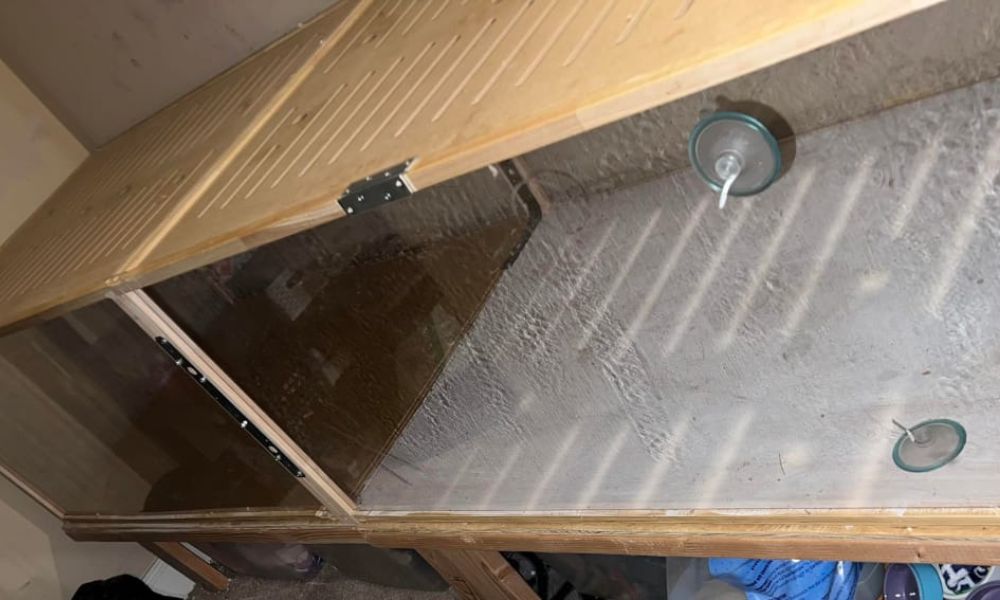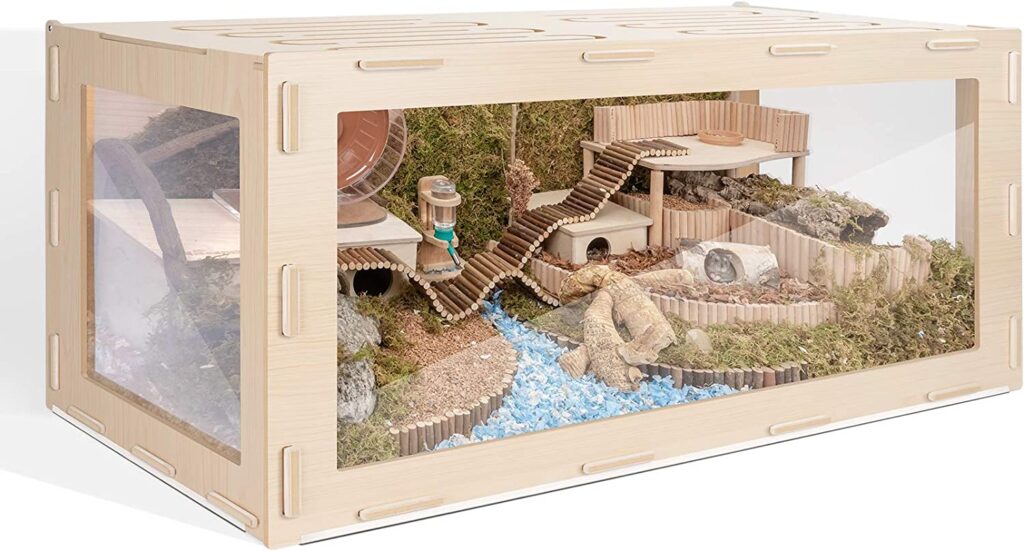You must be very careful when choosing a hamster cage or enclosure, especially if it is a Wooden Hamster cage.
Hamsters need a lot of space to stay happy, and Wooden cages may give you plenty of space for your hamster. But do you know there are so many down points of wooden cages?
In fact, I have asked many hamster owners who have used almost all types of cages, and now I know how to choose a wooden cage for a hamster.
Let’s walk through the pros and cons of wooden hamster cages to learn which one will suit your hamster the best.

Are Wooden Cages Good for Hamsters?
Wooden cages can be a great choice for hamsters, as wooden cages are primarily big, fulfilling hamsters’ space requirements. However, Wooden cages have a lot of drawbacks; for instance, many hamsters chew the cage, and often hamsters’ urine soaks from the cage and others.
Not all wooden cages have these issues; a proper wooden cage can be best for a hamster.
Thus, these drawbacks can be avoided, and you can get a big wooden cage for your hamster if you know about the correct type of wooden cages.
Before that, you must know the pros and cons of wooden hamster cages.
Pros and Cons of Wooden Hamsters Cages
Pros
- Hamsters need a lot of space than regular cheap cages on the market. Wooden cages are primarily big that can be perfect for a hamster.
- In Wire cages, we often see various problems like climbing, bar biting, etc. But, in wooden cages, hamsters won’t be able to do these things.
- Hamsters often try to escape from wire cages through wire bars, but wooden cages are safe.
- In metal bottom cages, the urine of hamsters often causes corrosion and rust, making it a health hazard and damaging the cage. But wooden cages are safe.
- Wooden cages are easy to clean.
- Due to the big size, you can add more enrichment on wooden cages than normal ones.
- Natural-themed cage.
Cons
- Many hamsters, especially female Syrian hamsters, often try to chew wooden cages.
- The urine of hamsters often soaks and seeps on the wooden bottom. Making the cage smell bad, and it also grows bacteria.
- Not every woods are safe for hamsters. Thus, hamsters can often get sick licking the wood.
- Many wooden cages can also get splinters that can be dangerous for hamsters and harm them.
- The price of the wooden hamster cages is higher than the normal ones.

Niteangel Bigger World – MDF Aspen Terrarium for Hamster
Check on AmazonHow To Choose the Best Wooden Cages for Hamsters?
If you’ve planned to get a wooden cage for your hamster, and now after reading the negative points of wooden cages, you’re thinking, what to do? Then here’re a few considerations before getting the wooden hamster cage.
- Make Sure the Wood is Hard: When selecting a wooden cage for a hamster, ensure it is hard enough, so hamsters can’t chew it. Not every hamster chews a wooden cage, but if the hamster is aggressive, the hamster can chew the cage. For Dwarf hamsters and Syrian males, it is perfect. But, if you have a Syrian female hamster, you must be careful and ensure the wood is chew-proof.
- Plastic Layering: As told earlier, the urine of hamsters often seeps from the wooden cage; thus, make sure the wood is thicker and has plastic layering so it does not absorb moisture. If the cage absorbs moisture, the bacteria will grow and smell bad. So, The wood has to be thick, sturdy, and water-resistant.
- Make Sure the Cage is Built with Safe Woods: Not all the woods are safe for small pets; thus, before buying a wooden cage, you must ensure the wood is pet friendly and safe. Moreover, if you are making a DIY wooden cage, you should also be careful with the woods you’re using. Aspen, Ash, Elm, Bamboo, Cottonwood, Oak, and Mapple are all safe for hamsters.
- Proper Ventilation: Wire cages have good ventilation, but many cheap wooden cages often don’t have proper ventilation. So make sure the cage flows a lot of air for good ventilation. Usually, make sure the top has enough wire mesh ventilation.
- Woods Finishing: To finish the wooden cage carpenter uses colors, varnish, and others. But only pet-friendly colors and varnish can be used in your pet’s cage. So make sure your cage does not have unsafe colors and varnish.
FAQs
Is Plywood safe for hamster cages?
Plywood has glue that is unsafe for your small hamster, so it is better to stay away from plywood cages for hamsters. Also, the plywood is thin, which is not a good choice for hamsters. Lastly, it also gets a lot of splinters.
Do wooden hamster cages smell?
If the wooden cage is not water or moisture-proof, it can absorb moisture, and the cage will smell bad. So, make sure the wood is thicker and has a plastic or some layer to protect against moisture.
Similar Articles:

